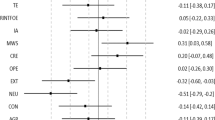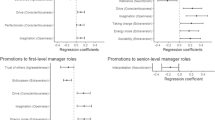Abstract
Purpose
The purpose of this study was to investigate the direct and indirect effects of personality characteristics on individual earnings and to examine a person’s leadership role occupancy as the potential mediator in the personality–earnings relationship.
Design/Methodology/Approach
Longitudinal survey data were collected from a sample of 209 individuals. Earnings were measured 6 years after the personality variables.
Findings
Two personality traits, i.e., Social Potency and Achievement, predict individual earnings longitudinally. The effects of personality were partially mediated by the person’s occupancy of leadership roles in the workplace. For those occupying similar leadership positions, people higher in social potency still have greater earnings.
Implications
These findings lend support for personality assessment in personnel selection and have important implications for leadership development and individual career success.
Originality/Value
Previous research suggests that personality influences individual earnings beyond the effects of traditional human capital variables. This study is among the first to distinguish personality’s direct and indirect (through leadership role occupancy) effects on individual earnings. The findings provide direct support for the incentive-enhancing property of personality as well as indirect support for the trait activation theory on the personality–earnings relationship.

Similar content being viewed by others
Notes
A subset of the data has been used in an earlier study on genetic influence on personality and leadership, which was published elsewhere. However, the current study asks unique research questions that were not examined in the previous study.
References
Arvey, R. D., Rotundo, M., Johnson, W., Zhang, Z., & McGue, M. (2006). The determinants of leadership role occupancy: Genetic and personality factors. The Leadership Quarterly, 17, 1–20. doi:10.1016/j.leaqua.2005.10.009.
Barrick, M. R., & Mount, M. K. (1991). The big five personality dimensions and job performance: A meta-analysis. Personnel Psychology, 44, 1–26. doi:10.1111/j.1744-6570.1991.tb00688.x.
Barrick, M. R., Mount, M. K., & Judge, T. A. (2001). Personality and performance at the beginning of the new millennium: What do we know and where do we go next? International Journal of Selection and Assessment, 9, 9–30. doi:10.1111/1468-2389.00160.
Becker, G. S. (1964). Human capital: A theoretical and empirical analysis. New York: Columbia University Press.
Bettencourt, L. A., Gwinner, K. P., & Meuter, M. L. (2001). A comparison of attitude, personality, and knowledge predictors of service-oriented organizational citizenship behaviors. The Journal of Applied Psychology, 86, 29–41. doi:10.1037/0021-9010.86.1.29.
Boudreau, J. W., Boswell, W. R., & Judge, T. A. (2001). Effects of personality on executive career success in the United States and Europe. Journal of Vocational Behavior, 58, 53–81. doi:10.1006/jvbe.2000.1755.
Bowles, S., Gintis, H., & Osborne, M. (2001). Incentive-enhancing preferences: Personality behavior and earning. The American Economic Review, 91, 155–158.
Church, A. T. (1994). Relating the tellegen and five-factor models of personality structure. Journal of Personality and Social Psychology, 67, 898–909. doi:10.1037/0022-3514.67.5.898.
Duncan, G., & Dunifon, R. (1998). Soft-skills and long-run market success. Research in Labour Economics, 17, 123–149.
Feinstein, L. (2000). The relative economic importance of academic, psychological and behavioral attributes developed in childhood. Centre for Economic Performance Discussion Paper 443.
Funder, D. C. (2001). Personality puzzle (2nd Ed. ed.). New York, London: Norton.
Goldsmith, A., Veum, J., & Darity, W. (1997). The impact of psychological and human capital on wages. Economic Inquiry, 35, 815–829.
Gough, H. G. (1989). A leadership index on the California psychological inventory. Journal of Counseling Psychology, 16, 283–289. doi:10.1037/h0027717.
Groves, M. O. (2005). How important is your personality? Labor market returns to personality for women in the US and UK. Journal of Economic Psychology, 26, 827–841. doi:10.1016/j.joep.2005.03.001.
Harrell, T. W. (1969). The personality attributes of high earning MBAs in big business. Personnel Psychology, 22, 457–463. doi:10.1111/j.1744-6570.1969.tb00346.x.
Harrell, T. W., & Alpert, B. (1989). Attributes of successful MBAs: A 20-year longitudinal study. Human Performance, 2, 301–322. doi:10.1207/s15327043hup0204_4.
Heslin, P. A. (2005). Conceptualizing and evaluating career success. Journal of Organizational Behavior, 26, 113–136. doi:10.1002/job.270.
Hill, N. C., & Ritchie, J. B. (1977). The effect of self-esteem on leadership and achievement: A paradigm and a review. Group and Organization Studies, 2, 491–503. doi:10.1177/105960117700200410.
Hofmann, D. A., & Jones, L. M. (2005). Leadership, collective personality, and performance. The Journal of Applied Psychology, 90, 509–522. doi:10.1037/0021-9010.90.3.509.
Hogan, R., Curphy, G. J., & Hogan, J. (1994). What we know about leadership: Effectiveness and personality. The American Psychologist, 49, 493–504. doi:10.1037/0003-066X.49.6.493.
Hough, L. M. (1997). Personality at work: Issues and evidence. In M. Hakel (Ed.), Beyond multiple choice. Hillsdale, NJ: Erlbaum.
Hough, L. M. (1998). The millennium for personality psychology: New horizons or good old daze? Applied Psychology: An International Review, 47, 233–261.
Hough, L. M., & Ones, D. S. (2001). The structure, measurement, validity, and use of personality variables in industrial, work, and organizational psychology. In N. Anderson, D. Ones, H. Sinangil, & C. Viswesvaran (Eds.), Handbook of industrial, work, and organizational psychology: Personnel psychology (Vol. 1, pp. 233–267). London: Sage Publications.
Judge, T. A., Bono, J. E., Ilies, R., & Gerhardt, M. W. (2002a). Personality and leadership: A qualitative and quantitative review. The Journal of Applied Psychology, 87, 765–780. doi:10.1037/0021-9010.87.4.765.
Judge, T. A., Heller, D., & Mount, M. K. (2002b). Five-factor model of personality and job satisfaction: A meta-analysis. The Journal of Applied Psychology, 87(3), 530–541. doi:10.1037/0021-9010.87.3.530.
Judge, T. A., Higgins, C. A., Thoresen, C. J., & Barrick, M. R. (1999). The big five personality traits, general mental ability, and career success across the life span. Personnel Psychology, 52, 621–652. doi:10.1111/j.1744-6570.1999.tb00174.x.
Judge, T. A., & Hurst, C. (2007). Capitalizing on one’s advantages: Role of core self-evaluations. The Journal of Applied Psychology, 92, 1212–1227. doi:10.1037/0021-9010.92.5.1212.
Kaufman, A. S. (1990). Assessing adolescent and adult intelligence. Boston: Allyn & Bacon.
Kirkpatrick, S. A., & Locke, E. A. (1991). Leadership: Do traits matter? Academy of Management Executive, 5, 48–60.
LePine, J. A. (2003). Team adaptation and postchange performance: Effects of team composition in terms of members’ cognitive ability and personality. The Journal of Applied Psychology, 88, 27–39. doi:10.1037/0021-9010.88.1.27.
Lyubomirsky, S., King, L., & Diener, E. (2005). The benefits of frequent positive affect: Does happiness lead to success? Psychological Bulletin, 131, 803–855. doi:10.1037/0033-2909.131.6.803.
McLean, J. E., Kaufman, A. S., & Reynolds, C. R. (1989). Base rates of WAIS–R subtest scatter as a guide for clinical and neurological assessments. Journal of Clinical Psychology, 45, 919–926. doi:10.1002/1097-4679(198911)45:6<;919::AID-JCLP2270450614>;3.0.CO;2-J.
Melamed, T. (1996). Validation of a stage model of career success. Applied Psychology: An International Review, 45, 35–65.
Muthén, L.K., & Muthén, B.O. (1998–2007). Mplus User’s Guide (5th ed.,). Los Angeles, CA: Muthén & Muthén.
Ng, T. W. H., Eby, L. T., Sorensen, K. L., & Feldman, D. C. (2005). Predictors of objective and subjective career success: A meta-analysis. Personnel Psychology, 58, 367–408. doi:10.1111/j.1744-6570.2005.00515.x.
Nicholson, N., & de Waal-Andrews, W. (2005). Playing to win: Biological imperatives, self-regulation, and trade-offs in the game of career success. Journal of Organizational Behavior, 26, 137–154. doi:10.1002/job.295.
Nyhus, E. K., & Pons, E. (2005). The effects of personality on earnings. Journal of Economic Psychology, 26, 363–384. doi:10.1016/j.joep.2004.07.001.
Orpen, C. (1983). The development and validation of an adjective check-list measure of managerial need for achievement. Psychology (Savannah, Ga.), 20, 38–42.
Patrick, C. J., Curtin, J. J., & Tellegen, A. (2002). Development and validation of a brief form of the multidimensional personality questionnaire. Psychological Assessment, 14, 150–163. doi:10.1037/1040-3590.14.2.150.
Schmidt, F. L., & Hunter, J. E. (1998). The validity and utility of selection methods in personnel psychology: Practical and theoretical implications of 85 years of research findings. Psychological Bulletin, 124, 262–274. doi:10.1037/0033-2909.124.2.262.
Tellegen, A. (1982). Brief manual for the differential personality questionnaire. Minneapolis, Minnesota: University of Minnesota.
Tellegen, A., & Waller, N. G. (2001). Exploring personality through test construction: Development of the multidimensional personality questionnaire. In S. R. Briggs & J. M. Cheek (Eds.), Personality measures: Development and evaluation (Vol. 1). Greenwich, CT: JAI press.
Tett, R. P., & Burnett, D. B. (2003). A personality trait-based interactionist model of job performance. The Journal of Applied Psychology, 88, 500–517. doi:10.1037/0021-9010.88.3.500.
Tett, R. P., & Christiansen, N. D. (2007). Personality tests at the crossroads: A response to Morgeson, Campion, Dipboye, Hollenbeck, Murphy, and Schmitt (2007). Personnel Psychology, 60, 967–993. doi:10.1111/j.1744-6570.2007.00098.x.
Thoresen, C. J., Bradley, J. C., Bliese, P. D., & Thoresen, J. D. (2004). The big five personality traits and individual job performance growth trajectories in maintenance and transitional job stages. The Journal of Applied Psychology, 89, 835–853. doi:10.1037/0021-9010.89.5.835.
Watson, D., & Clark, L. A. (1997). Extraversion and its positive emotional core. In R. Hogan, J. A. Johnson, & S. R. Briggs (Eds.), Handbook of personality psychology (pp. 767–793). San Diego, CA: Academic Press.
Witt, L. A., Burke, L. A., Barrick, M. R., & Mount, M. K. (2002). The interactive effects of conscientiousness and agreeableness on job performance. The Journal of Applied Psychology, 87, 164–169. doi:10.1037/0021-9010.87.1.164.
Author information
Authors and Affiliations
Corresponding author
Additional information
Received and reviewed by former editor, George Neuman.
Rights and permissions
About this article
Cite this article
Zhang, Z., Arvey, R.D. Effects of Personality on Individual Earnings: Leadership Role Occupancy as a Mediator. J Bus Psychol 24, 271–280 (2009). https://doi.org/10.1007/s10869-009-9105-5
Published:
Issue Date:
DOI: https://doi.org/10.1007/s10869-009-9105-5




